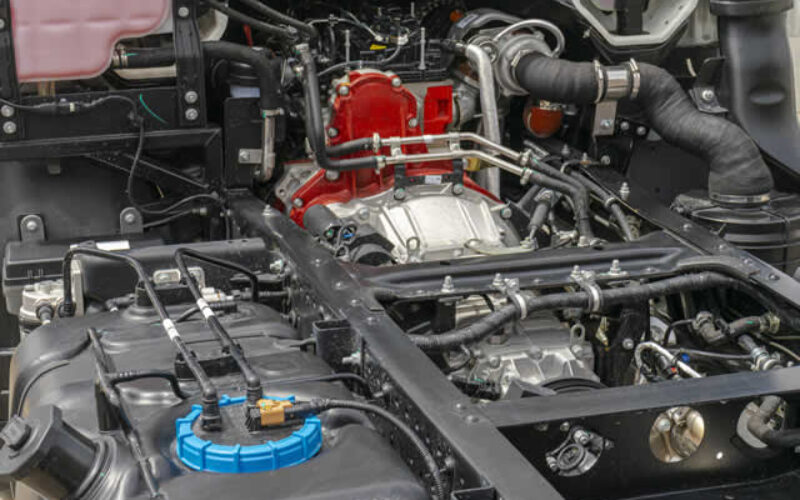With proper care and attention, you can significantly extend the life of your truck’s engine, avoid engine runaways, reduce costly repairs, and ensure consistent performance.
This article delves into the average lifespan of a truck engine, factors that affect its longevity, and actionable maintenance tips to keep it running efficiently.
Understanding the Average Lifespan of a Truck Engine
On average, a well-maintained truck engine can last between 500,000 and 1,000,000 kilometers, with some heavy-duty engines reaching even greater distances. However, this depends on various factors, including the type of truck, driving conditions, and the quality of maintenance.
Diesel engines, for instance, tend to last longer than gasoline engines due to their robust design and lower operating speeds.
The Importance of Truck Engine Parts and Their Maintenance
Every component within a truck’s engine works together to ensure smooth operation. Key truck engine parts, such as pistons, cylinders, and crankshafts, play a vital role in the engine’s performance. If even one part fails or operates inefficiently, it can lead to a domino effect of problems.
For instance, worn-out spark plugs can affect fuel efficiency and lead to misfires, while a failing oil pump can cause insufficient lubrication, resulting in engine overheating. Regular inspection and replacement of these parts ensure the engine operates optimally.
Using high-quality replacement parts from trusted suppliers is another crucial step to avoid subpar components that could compromise engine performance.
Factors That Impact the Lifespan of a Truck Engine
Several elements influence how long your truck engine will last. These include:
-
Driving Habits:
Aggressive acceleration, excessive idling, and harsh braking can place unnecessary strain on the engine. -
Load Capacity:
Overloading a truck frequently can lead to premature wear and tear. -
Maintenance Frequency:
Regular servicing and timely repairs are critical to the engine’s health. -
Environmental Conditions:
Extreme temperatures, dusty environments, and rough terrains can accelerate engine wear.
Addressing these factors through proactive maintenance is key to maximizing engine longevity.
Essential Maintenance Tips to Extend Engine Life
To ensure your truck’s engine lasts as long as possible, follow these maintenance practices:
-
1. Perform Regular Oil Changes
Oil is the lifeblood of an engine, reducing friction and preventing overheating. Over time, oil degrades and loses its lubricating properties. Stick to the oil change intervals recommended in your truck’s manual, and always use the correct type of oil for your engine.
-
2. Monitor and Replace Filters
Air and oil filters prevent contaminants from entering the engine. Clogged filters can restrict airflow or allow dirt to circulate, leading to reduced performance and potential damage. Inspect and replace filters as needed to maintain engine health.
-
3. Keep an Eye on the Cooling System
The cooling system prevents the engine from overheating. Regularly check the coolant levels, inspect the radiator for leaks, and flush the system periodically to remove deposits. Neglecting the cooling system can result in costly repairs due to engine overheating.
-
4. Inspect Belts and Hoses
Belts and hoses are essential for connecting various engine components. Cracked belts or leaking hoses can lead to breakdowns. Regularly inspect these parts and replace them at the first sign of wear.
-
5. Pay Attention to Warning Signs
Unusual noises, reduced fuel efficiency, or warning lights on the dashboard can signal engine problems. Addressing these issues promptly can prevent more significant damage and costly repairs.
-
6. Avoid Overloading
Consistently hauling loads that exceed your truck’s capacity can strain the engine and other components. Always adhere to the manufacturer’s load recommendations to avoid premature wear and tear.
-
7. Warm Up Your Engine
Particularly in colder climates, giving your engine a few minutes to warm up before driving allows the oil to circulate and lubricate all moving parts, reducing wear during operation.
-
8. Use High-Quality Fuel
Low-quality fuel often contains impurities that can clog the fuel injectors and damage the engine. Always opt for fuel from reputable sources to protect your engine, maintain performance, and stay safe in different conditions.
When to Replace a Truck Engine
Despite regular maintenance, there comes a time when even the best engines need replacement. Warning signs include consistent overheating, frequent breakdowns, or excessive oil consumption. In such cases, replacing the engine or rebuilding it with new truck engine parts may be more cost-effective than continued repairs.
The lifespan of a truck engine depends largely on how well it is maintained. By understanding the importance of proper care, including regular oil changes, timely replacement of truck engine parts, and adherence to recommended servicing intervals, you can significantly extend the life of your engine.
Not only does this save money in the long run, but it also ensures your truck remains reliable for years to come. Take proactive steps today to keep your truck running smoothly—your engine will thank you.
other related articles of interest:
Image Credit: by Pixabay
end of post … please share it!
-------------------------------------------------------------------------------------------------------------
-------------------------------------------------------------------------------------------------------------
home remodeling reference (links to internal page)
 |
 |
 |
 |
| directory | photos | forms | guide |
Helpful article? Leave us a quick comment below.
And please share this article within your social networks.











